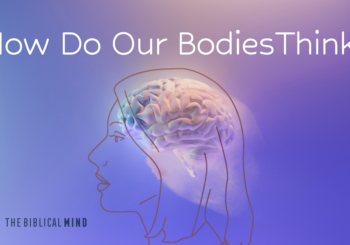Part of the Purifying Ourselves: Moral Formation in the Bible series
Moral Formation Involves the Head and the Heart—Simultaneously
It’s common to claim that the use of Psalms plays a formative role in the life of the person of faith.
For instance, the theologian NT Wright suggests that “the regular praying and singing of the Psalms is transformative. It changes the way we understand some of the deepest elements of who we are.”11. N.T. Wright, Finding God in the Psalms, 7. And in his reflections on the Psalms, the twentieth-century Christian theologian Dietrich Bonhoeffer writes that “the Psalms have been given to use precisely so that we can learn to pray them.”2Psalms: The Prayer Book of the Bible, 157.
Enjoying this article? Read more from The Biblical Mind.
Indeed, throughout history, the Psalms have been the prayer book of the Christian and Jewish faiths. For example, a selection from Psalm 126 is typically recited or sung before the grace used after a meal (Birkat Hamazon) on Shabbat and Jewish holidays. Or, to take another example, the words of Psalm 51:15, “open my lips, Lord, and my mouth will declare your praise,” are recited each morning by those who participate in the Christian practice of morning prayer.
In reciting these simple words each day, they become part of the thought-life of those who pray together; they are uttered with little effort and roll off the tongue with ease. But how do they transform people of faith?
Any discussion of changes of behavior and changes of thinking will be underpinned by a particular way of imagining the human person—an “anthropology.” Whether we reflect on it often or not, we all have ways of making sense of ourselves and others—stories we tell about our thinking and our behavior, and ideas about what is needed to effectively change our thinking and behavior. It is helpful to step back and think about these stories; what they say about who we are and how we change.
We write this from two different perspectives; one of us (Gideon) is a developmental psychologist, and the other (Josh) a theologian and Anglican priest. Our recent work, focusing primarily on Christian Theology, has sought to address the anthropological question: what kind of creatures are we? We think that by drawing upon resources from psychology and theology we can both critique previous responses to this question and offer helpful ways of reflecting on this question.
Brains-on-Sticks or Hearts-on-Legs?
So, what kind of creatures are we? And how does that bear on our spiritual formation through the Psalms?
The default position, at least in many Christian traditions, has been to focus on what we believe. If we speak clearly and authentically, sing theologically sound hymns or songs, and ensure that our young people are well drilled on the importance of “religious values,” then we won’t go too far wrong. Nowhere is this more exemplified than in the service in which the only real focus is on the preached sermon. Perhaps a song or two is helpful to get us ready to listen (so long as the music doesn’t emotionally manipulate us), but Church is really about sermons. The contents of corporate worship, or so it would seem, are nothing more than a collection of ideas.
We find similar ideas in discussions of the Psalms. It might be supposed that the Psalms merely provide a corrective to our worldview, such that we are given a vision for what to believe about God, the world and ourselves. Take the opening two verses of Psalm 139, for example:
You have searched me, Lord,
and you know me.
You know when I sit and when I rise;
you perceive my thoughts from afar.
What might the regular recitation of these verses teach us? Well, one plausible answer might be that these verses teach us that God is omniscient; he knows everything about us. Reciting these words regularly shapes our understanding of God, and might in turn lead us to act in such a way that we become more aware of God in our daily thoughts and actions.
It has been suggested by some that this way of thinking about worship views human beings as “brains-on-sticks,” paying little attention to how our bodies and our emotions are shaped by liturgy.3See James K.A. Smith, You Are What You Love.
But this way of thinking about human beings radically misunderstands the kind of creatures we are. Believing the right things does not always seem to be enough. We know all too well that merely believing that the early morning run before work is good for us does not always result in picking up our running shoes at 6am and trudging out the door in the cold. The problem is not that we don’t believe in the value of things, but that human beings aren’t shaped only by what they believe.
Enter the alternative. Unlike the brains-on-sticks model, the heart-on-legs model recognizes that I am not simply a mind that I can pump with right beliefs until right action is produced. I am a body, and I have desires that don’t always align with my beliefs. In fact, we might say, you are what you love. The philosopher and theologian James K.A. Smith tells us that rather than starting with the things that we believe, we would do better to begin by considering how human beings desire. Every practice we perform in our daily lives, from checking the news on a smartphone, to eating takeout on a Friday night, to where and how we do our public worship, shapes what we desire and not just what we believe. What we desire shapes the kind of person we are.
Rather than thinking of human beings as brains-on-sticks into which the religious leader or minister pumps information every week, Smith wants us to see that what we do inside of public worship trains us to desire certain things and not others. In fact, most of the time we attend very little to what we believe; instead, we are creatures that are formed by practices that direct our desires. Take a familiar practice in many traditions: That of corporate confession. Consider the words of Psalm 51, which may be used in such a context:
Have mercy on me, O God,
according to your unfailing love;
according to your great compassion
blot out my transgressions.
Wash away all my iniquity
and cleanse me from my sin.
These words, even if we hear them week in, week out, may have little immediate bearing on what we believe. The words may even become vain repetition to us. But this does not mean the words have no effect on us. Instead, we are urged to see that these words provide a kind of training, in which the way we see our own sin and God’s forgiveness, are slowly shifted. Through the repetition of these powerful words, we become the kind of people who desire to follow God’s goodness and loathe the presence of our own sin.
We see such a thought expressed in Bonhoeffer’s reflections on the Psalms, for instance:
It does not matter whether the Psalms express exactly what we feel in our heart at the moment we pray. Perhaps it is precisely the case that we must pray against our own heart in order to pray rightly.4Bonhoeffer, Prayer Book of the Bible, 157.
As Bonhoeffer observes, the words of, say, Psalm 13:5 (“but I trust in your unfailing love; my heart rejoices in your salvation”) may be difficult for us to say in periods of our life. Many of us feel unlovable for many different reasons. But in using these words regularly, we are not solely convinced to believe that God’s love is unfailing, but rather our desires are shaped so that we can come to see ourselves and God differently. The critique of the brains-on-sticks understanding of worship names something than many of us have felt for far too long as we have wrestled with our own inability to truly change our spiritual lives by simply hearing more sermons and reading more theology books.
Brains and Hearts: A Holistic Model of Ritual Formation
Many psychologists would wholeheartedly endorse Smith’s emphasis on embodiment and the importance desire (or affect) in reflecting on the ways rituals shape us. Case closed. Or so it may seem.
It is our view that the brains-on-sticks vs. hearts-on-legs debate is not as clear cut as it would first appear. Though Smith is undoubtedly right to push back on overly belief-centered understandings of formation, a desire-first model threatens to lose something crucial about the way rituals (like reciting Psalms) form us. We want to highlight three ways in which the discussion is more complex than it first appears. Understanding human believing and desiring is a key focus for psychological research, and we believe that the findings of the psychological sciences can provide helpful insights into the kind of creatures we are.
Neither Brain nor Heart Is Primary
Though the brains-on-sticks and heart-on-legs approaches disagree, they are in fact underpinned by a similar strategy. Both want to argue that there is a part of our selves that is primary, from which all else emerges. The brain on a stick approach wants to position believing as primary, with all else flowing out of having the right kind of beliefs. Similarly, the hearts-on-legs approach wants to position desire as fundamental, with all our thoughts and behaviors shaped by our desires. In contrast, we argue that the very attempt to make one part of ourselves primary is misguided.
Psychologists are interested in questions of the brain and the heart but adopt a different terminology. They use the term “cognition” to refer to the processes involved in forming our beliefs—our thinking processes. A psychologist would define cognition as those processes a person uses to organize incoming information that they then use to plan and direct behavior. For example, to cook a meal we may need to remember the recipe, plan in what order we prepare the ingredients, and track the temperature of the pan while chopping the onions, all while ignoring the phone ringing. Psychologists use the term “affect” to refer to the processes involved in forming our desires—our emotional or feeling processes. Affect covers not only the different emotional states that we experience (happiness, anger and so on) but also our motivations—wanting to belong, wanting to be fulfilled.
What do psychologists have to say about the relation between believing and desiring—between cognition and affect? Like any area of scientific study, there are debates and disagreements, but certain themes and ideas stand out. The first relevant insight is that cognition and affect are interdependent. Our behavior is always driven by a complicated mix of cognitive and affective processes.
Research that has looked at both human behavior and the human brain has highlighted that even our seemingly “cold” cognitive processes, such as decision-making and memory, actually involve an interplay of cognition and affect, with people’s affective state influencing how they process and remember information.5Pessoa et al., 2012. Similarly, as people process emotions, they use cognitive processes to interpret the experience and regulate their response.6Schmeichel and Tang, 2015. Furthermore, recent neuroscientific evidence has challenged the idea that particular cognitive and affective processes can be located in specific parts of the brain, instead finding that the regions involved in cognitive and affective processes overlap.7Lindquist and Feldman-Barrett, 2012.
Neither belief nor desire are primary; affect and cognition work together. And since cognition doesn’t always involve linguistic reasoning, we need some account of “thinking” that does not rely on language. This is our next point.
The Complexity of Believing
The second set of insights from psychological science pertains to the complexity of believing. Psychologists have highlighted that cognition is complex and involves many different processes. We would be mistaken if we thought that cognition focused only those things we could write in propositions or speak using language. Cognition happens at a pre-linguistic level, such as in the “proto-conversations” babies have with their caregivers before the babies can speak.8Bateson, 1975.
To capture different types of cognition, psychologists draw a distinction between implicit and explicit cognitive processes. Psychologist and Nobel laureate Daniel Kahneman has given these the catchier label of “thinking fast” and “thinking slow.”9Kahneman, 2011. Broadly speaking, explicit cognitive processes are of the kind that have propositional content and can be expressed using language. They are typically slow and reflective. In contrast, implicit cognitive processes are those that cannot be expressed in propositional terms and are typically fast and automatic. Implicit processes are genuinely “thinking” processes; they involve processing incoming information and preparing and planning behavior. But they do so in a different way than the slow, reflective processes we might typically associate with terms like “believing.”
There is broad agreement that the different kinds of cognitive processes allow for flexible ways of dealing with different challenges. For example, a violinist learning a difficult piece needs to acquire different kinds of knowledge. She will have acquired implicit-level understanding of how to angle the bow or where to grip the violin’s neck, understanding that she cannot propositionally express. However, it is also helpful to receive instruction, learning facts that help guide her implicit knowledge.
So, what does this mean for our brains-on-sticks and hearts-on-legs accounts? We have already argued that neither believing nor desiring ought to be viewed as primary. But we can also add that humans have a range of thinking processes that go beyond forming explicit, propositional beliefs. The brains-on-sticks view focuses heavily on explicit thinking, and thus lacks a clear story about how our implicit thinking is shaped. The hearts-on-legs view suggests we should look more at our habits and practices but misses that even very simple habits and practices involve implicit cognitive processes—they are not completely “thoughtless.” On a holistic view, believing is seen as complex and multifaceted, and thus changing our beliefs will require a range of different practices that shape our thinking on many different levels.
In It Together
The final point we think is important to stress is the deeply social nature of human development. The twentieth-century psychologist Lev Vygotsky wrote that “it is through others we become ourselves.”101978. It is widely held that our ability to think and desire is profoundly shaped by our motivation to connect with others, and the unique ways in which we can interact with others.
If we look at human development, we see the profound importance of social interaction in shaping us. It has been widely argued that we first learn to regulate our emotions in the context of relationships with attachment figures—parents, caregivers—rather than having to learn how to do so by ourselves. It has also been argued that this is true of cognitive processes. For example, several researchers have argued that our capacity to reason first develops in the context of early social interactions, where we try to figure out people’s reasons for their behavior. We then apply this ability in a range of different problem-solving contexts, but its developmental origins are in social interactions.
This view challenges both the brains-on-sticks and hearts-on-legs approaches, which risk a focus on individuals at the expense of a social and communal view of how we develop and change. More than just a psychologically holistic approach, we suggest that we ought to understand the role of relationships and communities if we are to understand how people change. This means not just studying the habits and practices of individuals, but communities too. If we want to see genuine changes in our behavior, we ought to consider not only our personal habits, but what we do in and through our communities.
Relating These Observations to Our Lives
These three observations from psychological sciences (belief and desire are hard to separate, believing is complex, and social interaction is key) have important bearings on how we think about the nature of rituals like psalm recitation and how these might change our behavior for the better. But we must begin by noting that the brains-on-sticks vs. hearts-on-legs debate is too simplistic. A holistic approach recognizes that both believing and desiring are key for changing our behavior in the long term: neither is primary.
Return to the example of using a psalm of confession. Confession requires recognizing that certain things have control over my desires and draw me away from God. In using a penitential psalm, like Psalm 51, we are challenged to look again at ourselves in relationship to God and our world. But it is not as simple as controlling only our desires or only our beliefs. Confession (using Psalms or otherwise) is a discipline that influences cognition as much as affect; these words shape my beliefs about myself as well as my desires. We would be remiss to reflect only on how using these words of confession has changed what we think or only on how it has changed how we feel. A better question to ask is how our whole selves have responded to God and to the world through the use of Psalms.
Next, we should remember that beliefs are not always conscious or expressible through language. Repeating the opening words of morning prayer (“open my lips, Lord, and my mouth will declare your praise,” Psalms 51:15) is formative not only because it shapes our desires about God, but also because it shapes our implicit beliefs about God. The old myth that we should only repeat something if we really “mean it” should be questioned. There are plenty of things we do not mean that affect how we believe and desire. But this is precisely why it is so important to think carefully about our habits. Those hours spent scrolling through Instagram are not neutral. As Smith helpfully points out, every habit has a purpose and not every habit aims at drawing us closer in relationship with God.
Finally, we cannot do this alone. Our beliefs and our desires have never been formed in isolation. If we set out to singlehandedly change our behavior, we will likely fail. The Psalms were written not only for private devotion but also to be the prayerbook of the community of faith. As we slowly emerge from one of the most dramatic seasons of social isolation in recent history, we must learn again the importance and value of community to help shape and challenge one another.
End Notes
1. N.T. Wright, Finding God in the Psalms, 7.
2. Dietrich Bonhoeffer, Psalms: The Prayer Book of the Bible, 157.
3. See James K.A. Smith, You Are What You Love.
4. Bonhoeffer, Prayer Book of the Bible, 157.
5. Pessoa et al., 2012.
6. Schmeichel and Tang, 2015.
7. Lindquist and Feldman-Barrett, 2012.
8. Bateson, 1975.
9. Kahneman, 2011.
10. 1978.
Image created by Rubner Durais
Subscribe now to receive periodic updates from the CHT.






